01 Dec2015
By Hannah Maes and Kristin McCabe
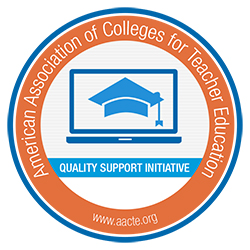
Did you know that AACTE’s six Online Professional Seminars (OPSs) can be taken in any order? In fact, the seminars have no prerequisites, meaning you can skip what you already know and jump right in to the professional learning you need most.
Or are you looking for a well-rounded understanding of assessment and accreditation issues for educator development, program improvement, and quality assurance systems? Then start from the beginning and run through the complete sequence of courses.
Offered through AACTE’s Quality Support Initiative, the seminars are scheduled to be not only flexible but also convenient. Each course is completed asynchronously over a 3- to 4-week period, and multiple session options let you work around your schedule. We’ll be starting several course sections this month, including some that run over the holidays, if that suits your needs—see the current schedule of available dates.
17 Nov2015
By Jennifer Roth and Rene Roselle
The AACTE Clinical Practice Commission (CPC) is composed of 25 members whose experiences represent the spectrum of teacher preparation, from PK-12 through higher education graduate programs, as well as the perspectives of national education organizations.
The CPC conducted its initial work via a series of conference calls and electronic communications throughout the spring and summer, culminating in an August meeting in Washington, DC, hosted by AACTE (see report here). Over the 2 days of intense dialogue and collaboration, commissioners arrived at a common understanding of the current status of clinical practice and a shared sense of commitment to the urgent, complex work of the commission. Our passionate colleagues exhorted the group to “be bold!” in our efforts to both reflect the excellent work already in progress nationally and provide leadership for the future.
17 Nov2015
By Laurie A. Henry and Cindy Diehl Yang
The AACTE Clinical Practice Commission (CPC) has been working over the last 6 months to examine the state of clinical practice in educator preparation. With a charge to develop a white paper that provides a common understanding of effective approaches to field experiences and clinical practice, members of the CPC met for a 2-day working session in Washington, DC, in August.
Members of the commission, who represent institutions of higher education, PK-12 school districts, and professional associations, formed workgroups around the core topics that will provide a foundational structure for the white paper: literature review, foundations of theory, foundations of practice, lexicon, and current context and policy background.
17 Nov2015
By Christine DeGregory
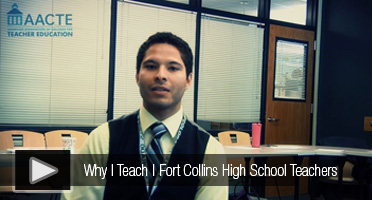
If you have been inspired by the previous Research-to-Practice Spotlight videos featuring the robust partnership between Colorado State University (CSU) and the Poudre School District (PSD) in Fort Collins, don’t miss the final mini-installment in the series, in which various teachers at Fort Collins High School share their passion for teaching. Below, Christine DeGregory reflects on what she witnessed during her visit with the partners last spring.
I’m a firm believer in the power of clinical practice—particularly clinical practice supported by a professional development school model. I had heard many wonderful things about the special partnership that Colorado State University (CSU) had nurtured with the Poudre School District (PSD), but having the opportunity to talk to partnership members and see their work in action reaffirmed to me that some common approaches to clinical practice can be successfully reimagined.
16 Nov2015
Congratulations to November Scholar of the Month Leonard D. Towns!
By Whitney Watkins
 Towns is a doctoral candidate in the Department of Educational Foundations, Leadership, and Technology at Auburn University (AL). His research interests include educational theory, policy, and program evaluation.
Towns is a doctoral candidate in the Department of Educational Foundations, Leadership, and Technology at Auburn University (AL). His research interests include educational theory, policy, and program evaluation.
His role as an adjunct professor in the Department of Psychology at Tuskegee University (AL) has allowed him to mentor future scholars and professionals. His encouragement of research has resulted in conference presentations by his students.
10 Nov2015
By Hannah Maes
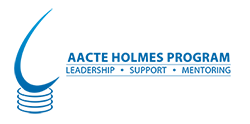
The AACTE Holmes Program recently welcomed nine new participating institutions, joining dozens of other educator preparation programs across the country that are providing targeted support to historically underrepresented students in education.
The following institutions signed up this fall to participate in the program, signifying their commitment to diversifying the teacher workforce:
03 Nov2015
By Hannah Maes

The immediate value of taking part in AACTE’s Online Professional Seminars is obvious: You get to enhance your peer network while gaining knowledge on crucial issues in the field, from assessment and data use to quality assurance systems and the nuts-and-bolts of preparing for national or regional accreditation. But there are other, long-term advantages to participating in the seminars offered through AACTE’s Quality Support Initiative.
The OPSs provide a framework that allows you and your institution to focus on your faculty. The professional development offered through the seminars strengthens your performance in your current position and prepares you for future ones. By developing participants’ skills regarding assessment and accreditation, the OPS series builds individuals’ confidence and enhances their competence.
20 Oct2015
By Hannah Maes and Kristin McCabe
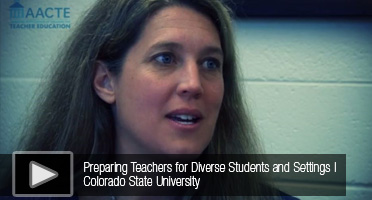
A new video in AACTE’s Research-to-Practice Spotlight Series shows education leaders from Fort Collins High School and Colorado State University discussing their work to prepare teacher candidates for special education situations and other diverse student needs. From understanding IEPs to tapping school-based counseling resources to differentiating instruction in both mainstreamed and self-contained classrooms, the program strives to expose candidates to a wide variety of students and settings, say Josh Richey, dean of students at the high school, and Wendy Fothergill and Juliana Searle, program advisers.
Today’s classrooms are more diverse than ever, and educator preparation programs such as those at Colorado State University (CSU) strive to give prospective teachers experiences across varied communities, in different school models, and with a broad range of students, including those with Individualized Education Programs (IEPs) for special education.
20 Oct2015
By Whitney Watkins

Congratulations to October Holmes Scholar of the Month Coralis Solomon!
Solomon is a second-year doctoral student in the counselor education program at the University of Central Florida (UCF). Her research interests are mindfulness and self-compassion in counseling.
Solomon has worked in La Amistad, a community agency where she provided mental health services to individuals suffering from traumatic experiences. She is currently coordinating an in-school community counseling clinic for a partnership with the UCF counselor education program and Seminole County Public Schools. This endeavor is serving as an excellent opportunity for counseling students to get a chance to work with a population they may not see in the clinic on campus. In addition, this partnership offers free services to families so they can take advantage of mental health counseling that they may not otherwise be able to afford.
16 Oct2015
By Hannah Maes

Data are ubiquitous in this day and age, and making sense of all the numbers and trends can be overwhelming. Yet using data wisely is critical to be able to learn from experience and determine strategic directions for improving what we do. So where do we start—how do we identify what information we need and appropriate sources to use? How do we recognize patterns in the data and their lessons for our work? And how do we put it all together to improve our programs and demonstrate our accountability?
06 Oct2015
By Michelle Kotek
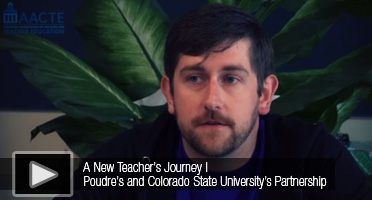
A new video in AACTE’s Research-to-Practice Spotlight Series focuses on a thriving partnership in Colorado from the perspectives of novice teachers prepared in a professional development school model. This blog highlights one teacher’s experience and offers insights from his assistant principal about the program’s success.
The forward-thinking partnership between Colorado State University (CSU) and the local Poudre School District employs a professional development school (PDS) model to prepare teachers who are ready to teach on Day 1. Their classroom is the classroom: Instead of taking their classes off site at the university, prospective teachers receive their lessons and then put them into practice in the same school building—with real kids and under the tutelage of a real teacher. While the program’s elements are fairly typical, its particular success comes from each course’s clinical component and support from a robust professional community.
06 Oct2015
By James O’Meara and Sharon Robinson
On September 25, 2012, United Nations Secretary-General Ban Ki Moon launched the UN Global Education First Initiative (GEFI) for making quality education available to all children, young people, and adults. This year, on the third anniversary of the GEFI launch, leaders from AACTE answered his call for assistance by committing to revive a longstanding partnership with the International Council on Education for Teaching (ICET). But why ICET, and why now?
What Is ICET?
ICET is a nongovernmental organization (NGO) working with educator preparation providers (EPPs) globally to ensure all learners will have access to a high-quality education in which educators are appropriately qualified and recognized as motivated and committed professionals and practitioners.
05 Oct2015
By Guneev Sharma
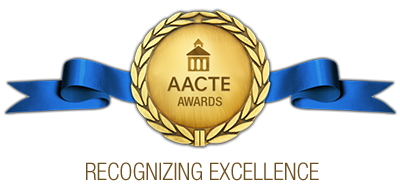
This is the final week to submit applications for the AACTE Awards Program. All entries for Best Practice Awards and Professional Achievement Awards must be submitted online by Friday, October 9, at midnight EDT.
The selection process for the awards is by peer review, led by AACTE’s standing committees. I asked one committee chair, Kevin J. Graziano of Nevada State College, how the awards program contributes to the profession. (Graziano chairs AACTE’s Committee on Innovation and Technology, which is responsible for reviewing applications for the Best Practice Award for the Innovative Use of Technology.)
05 Oct2015
By Hannah Maes

What constitutes “quality” in assessment? Educators have to know how to design assessments and scoring rubrics that are appropriate to their students’ specific situations as well as fair, valid, and reliable.
AACTE’s Online Professional Seminar (OPS) #1: Building Quality Assessments addresses this question in a 3- to 4-week introductory course that is free and open to all educators. By connecting simultaneously with experts and their peers in the field, OPS participants get the chance to compare their experiences, learn from each other, and discover best practices for assessment design.
02 Oct2015
By Whitney Watkins
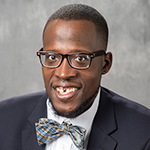
Congratulations to September 2015 Holmes Scholar of the Month LaMarcus Hall!
Hall is a second-year doctoral candidate in the curriculum and instruction program at Purdue University. His research interest is cultural spaces for underrepresented minorities in higher education.
Since joining the Holmes Scholars Program at the beginning of this summer, Hall has made a breakout performance in his role as a Holmes Scholar at his institution. His nominator was incredibly impressed with his contributions to the field, as well as his array of other accomplishments.








 Towns is a doctoral candidate in the Department of Educational Foundations, Leadership, and Technology at Auburn University (AL). His research interests include educational theory, policy, and program evaluation.
Towns is a doctoral candidate in the Department of Educational Foundations, Leadership, and Technology at Auburn University (AL). His research interests include educational theory, policy, and program evaluation.





